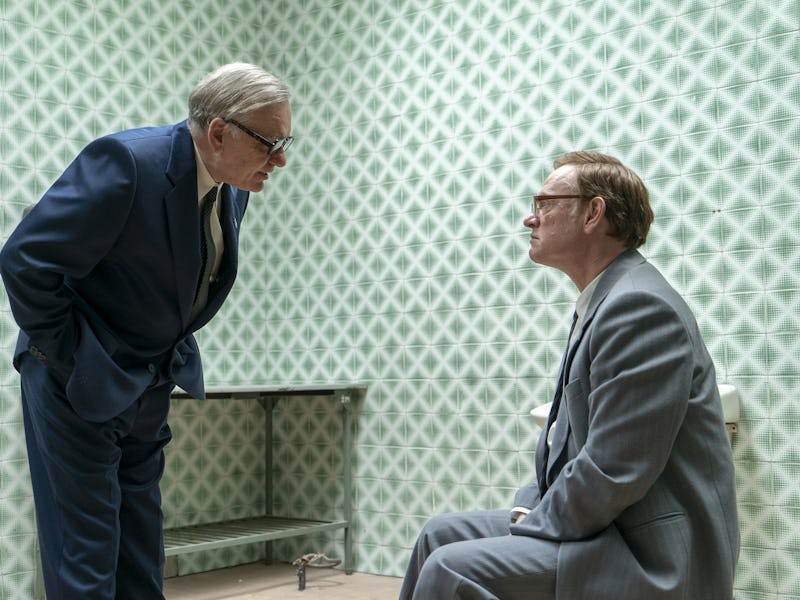'Chernobyl' Season 2? This Story Could Be the Gripping Follow-Up
"In many ways we learned all the wrong lessons from Chernobyl."

The final episode of Chernobyl aired this past Sunday, the last chapter in a dramatized story about a faulty reactor, a botched safety test, a violent explosion, a failed recovery, and the political aftermath that likely contributed to the fall of the Soviet Union.
But HBO’s Chernobyl is also the highest-rated TV Show ever on IMDb, and viewers would likely welcome more episodes in a story that quickly filled the hole in our brains that was previously filled with a gooey, Game of Thrones-flavored product. So, will there ever be a Chernobyl Season 2?
Series creator Craig Mazin told Decider that there could be a similar story to tell, but that that it wouldn’t be about what happened in Northern Ukraine after a nuclear reactor exploded in April, 1986. Here’s Mazin:
“If I came to HBO and said ‘I want to do another season of Chernobyl, except it’s gonna be about another terrible tragedy,’ whether it’s Bhopal or Fukushima or something like that, I would imagine they at least would give me polite interest.”
Bret Kugelmass, host of the long-running nuclear energy podcast Titans of Nuclear, had a similar answer as Mazin when asked by Inverse about Chernobyl Season 2. It. The best story to tell might be about the fall-out from the Fukushima disaster in Japan.
In 2011, a 9.0 magnitude earthquake struck the eastern coast of Japan, sending a tsunami into the country’s coast, triggering what would become the world’s worst nuclear disaster since Chernobyl. The tsunami killed more than 11,000 people, and the entire world watched in horror as the Fukushima Daiichi Nuclear Power Plant went up in flames, spewing radiation deep into the Pacific Ocean.
In the years after, Fukishima looked a lot like Chernobyl.
Kugelmass is the founder of the Energy Impact Center, a Washington, D.C.-based research institute that aims to reverse climate change over a 20-year period. Kugelmass also launched a new sub-podcast that focuses totally on HBO’s Chernobyl. (Here is the Apple Podcasts link.)
“An interesting follow-up would be a series depicting the response to the next-largest nuclear accident, at Fukushima, Japan, Kugelmass told Inverse, when we asked what stories in the long-term aftermath of Chernobyl deserved to be told.
In both scenarios, there were mistakes made, he says.
"In many ways we learned all the wrong lessons from Chernobyl."
“As an over-correction to Chernobyl’s accident management errors, authorities incorrectly assumed the same risks, namely widespread distribution of radioactive iodine,” Kugelmass says. “They conducted mandatory evacuation of the communities outside site of the Japanese nuclear accident, ironically creating a hazard through evacuation when there was no environmental hazard to avoid. Their actions failed to take into account the fundamental differences between a Chernobyl-style reactor (RMBK), which can blow up, and the far more common Light Water Reactor which melts down.”
Kugelmass says that the opposite of Chernobyl happened after Fukushima, but one result was the same: People suffered from a poor decision by the government. In the ‘80s in the Ukraine, they weren’t evacuated quickly enough. In the 2000s in Japan, they were evacuated unnecessarily.
“In the case of the Fukushima Light Water Reactor melting down, neither the public nor environmental was in any risk of hazard, and the great untold story is of the atrocities induced by the government’s unnecessary forced evacuation,” Kugelmass says.
“This botched evacuation instantly sentenced over one thousand of their immobile, elderly to death and then over the long run, through displacement, ruined the lives of hundreds of thousands, destroying their land, livelihood, and sense of home. The atrocities of the Japanese government’s misguided actions extend through today, self-imposing an unnecessary 200 Billion dollar cleanup cost and sabotaging industrial output and overall economy by keeping their other nuclear power plants offline.”
Keep reading:
- ‘Chernobyl’ on HBO: Author of ‘Midnight in Chernobyl’ Separates Fact From Fiction
- ‘Chernobyl’ on HBO: The Truth About Biorobots, the Joker, and “Egg Baskets”
- Is Chernobyl Safe? It Depends How You Define “Safe”
- Photos: Chernobyl’s Arch Engineers Wanted a Huge Challenge
- Will the Nuclear Ghost Town of Pripyat Ever Be Livable Again?
- 30 Photos of Modern-Day Chernobyl on the 30th Anniversary of the Disaster
- You Can Play ‘Pokémon Go’ Inside the Chernobyl Exclusion Zone